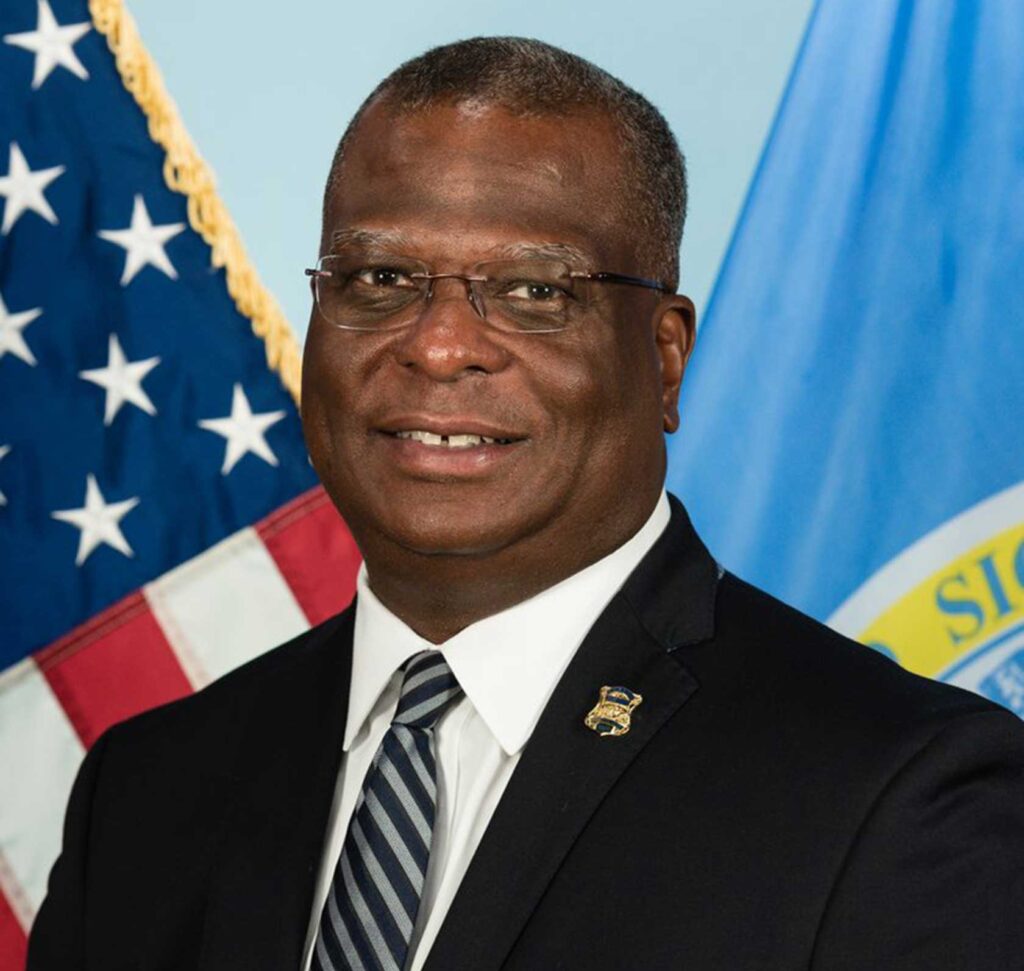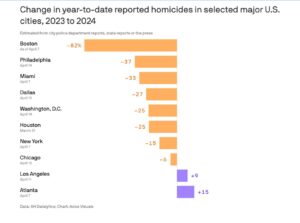
Homicides across the city of Boston declined by over 80% compared to the same time last year, according to statistics posted on the Boston Police Department’s website.
The report, created by the Boston Regional Intelligence Center, the BPD’s intelligence and analysis arm, showed a decrease in homicides from 18 in the period from January 1 to May 26, 2023, to three in that same five-month period this year. The city also saw notable dips in other violent and property crimes, including a 29 percent dip in violent sexual crimes and 2 percent drops in robberies and domestic aggravated assaults.
Compared to the five-year average, crime in Boston has steadily declined recently. In the first three months of the year, Boston saw the steepest decline in homicides of all major U.S. cities according to an analysis by AH Datalytics. The city is ahead of metropolitan areas such as Philadelphia, Washington, D.C., and New York, but advocates say the data should be viewed in a broader, regional context.
“While the decline in Boston is a step in the right direction, it certainly doesn’t tell the full story of the impact of gun violence across Massachusetts,” said a spokesperson for the Massachusetts Coalition to Prevent Gun Violence in an email to the Bay State Banner.
Boston may have made progress, the spokesperson said, but gun violence is still rampant in other communities such as Springfield and Brockton, a city with a high concentration of African Americans. Both have been the location of several shootings this year. She added that domestic violence-related murder-suicides are also a concern across the state.
In recent years, the city has escalated its efforts to quash violent crime and its introduction of programs that aim to do so, including a Plan to End Violence, the city’s summer safety plan, announced in May.
“Preventing violence is a year-round priority,” said Isaac Yablo, the city’s senior advisor for community safety in the press release, “but we have short-term work to do and have Summer-specific challenges to strategize around.”
The summer plan focuses on neighborhood support, violence intervention and prevention, and “a positive police presence in locations where violence is concentrated.”
Last year, Mayor Michelle Wu also outlined a violence prevention strategy that aims to reduce homicides by 20 percent over a three-year period.
“We are fortunate to have data and intelligence to help us focus resources [on] the small percentage of individuals who are driving crime in our city,” said BPD Commissioner Michael A. Cox in a statement to the Banner. “I don’t know if there is enough data available to say what is causing the decrease as we are only in June, but I can say that . . . our department is doing many things that may be having an impact.”
Cox added that the department’s “data-driven community policing” focuses on partnerships, and strategy to allocate resources based on community input have been influential.
The city has “created a network of centering violence as a public health approach in the well-being of young people — pulling them out of things that can push them towards violence, retaliatory violence, or associating with groups in their neighborhoods that might be engaged in violence,” said Shea Cronin, assistant professor of criminal justice at Boston University, in an interview with BU Today.
Cronin cited Safe and Successful Youth Initiative, which creates job opportunities, and the Shannon Community Safety Initiative, which aims to reduce gang violence, as examples of state-sponsored programs that have contributed to the decrease in violence in Boston.
He highlighted that predicting how the crime rate might shift throughout the rest of the year is challenging but said he had “a lot of confidence that it’s going to hold up in this direction.”
Even as Boston sees some positive change, the spokesperson for the Massachusetts Coalition to Prevent Gun Violence said BRIC’s report has only motivated the organization to ramp up its advocacy work, which involves pushing for bills at the state level and investing in community-based solutions to end gun violence.
“Our strategy will be to…increase our organizing work in gateway cities such as Brockton, Lynn, and Springfield,” the spokesperson said. Boston may have “critically important” resources to combat violence that “most gateway cities do not. This is a disparity that must be addressed.”







